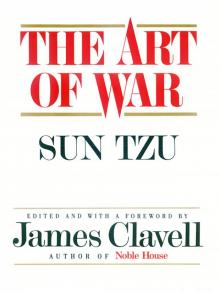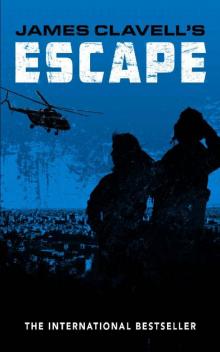- Home
- James Clavell
Whirlwind Page 82
Whirlwind Read online
Page 82
“Equality for women,” he shouted. “Democracy forever! Islam forever! Democracy and law and Islam forev—” The words died.
Ahead of the march men had formed a thick barrier across the road now, barring progress. The women to the forefront saw their anger and raised fists. Instinctively the women in the first half-dozen ranks tried to slow but could not. The swell of the thousands pushed them inexorably forward.
“Why’re those men so angry?” Sharazad asked, her happiness evaporating, the crush increasing.
“They’re just misguided, villagers mostly,” Namjeh Lengehi said bravely. “They want us as slaves, slaves, don’t be afraid! God is Great…”
“Link arms,” Zarah shouted, “they can’t stop us! Allahhhh-u Akbarrr…”
Among the men blocking the road was the man who had, at Evin Jail, led Jared Bakravan to slaughter. He had recognized Sharazad in the vanguard. “God is Great,” he muttered in ecstasy, his words drowned by the shouting, “God made me an instrument to send the evil bazaari to hell and now God has given into my hands the harlot daughter.” His eyes gloated over her, seeing her naked on the couch, spread, breasts proud, eyes filled with lust, mouth moist, lips moist, hearing her begging him, “Take me, take me, quick, for you no money, let me have it, all of it, quick, quick, fill me, stretch me, for you anything, quick quick…oh, Satan, help me suck God out of his organ…”
He jerked out his knife, loins throbbing, manhood proud, and hurled himself at her, “God is Greatttt…” His rush was sudden and he went across the space separating him from the women, knocked down half a dozen, reaching for her, but slipped and fell in his excitement, his knife flailing. Those he wounded were screaming and he fought to his feet and groped for her, seeing only her, her eyes wide, terror-stricken, knife in his fist ready to gut her, now only three paces away, two paces, one…his head filled with her perfume, the stench of the Devil Incarnate. The death blow began but never touched her and he knew Satan had sent an evil djinn his way—there was a monstrous burning in his chest, his eyes became sightless, and he died with the Name of God on his lips.
Sharazad stared down at the crumpled figure, Ibrahim beside her now, the gun in his hand, shouts and more screams and a roar of rage from a thousand women pressing behind them.
Another shot, another man fell screaming. “Forward for God!” Lengehi cried over her own fear, her shout taken up by Ibrahim who tugged at Sharazad: “Don’t be afraid, forward for women…”
She saw his confidence and for a moment mistook him for her cousin Karim so similar in height and build and face, then her terror and hatred at what had happened burst and she shouted, “Forward for my father… Down with zealots and Green Bands…down with murderers!” She grabbed Zarah. “Come on! Forward!” and she linked arms with her and with Ibrahim, her savior, so like Karim they could be brothers, and they started off again. More men were running to the front in support, the truck with the airmen among them.
Another knife wielder came at them screaming.
“God is Great…” Sharazad shouted, the horde with her, and before he was neutralized the screaming youth had slashed Namjeh Lengehi’s arm. Inexorably, the front ranks pressed forward, both sides roaring “God is Great,” both sides equally sure they were right. Then the opposition crumpled.
“Let them march,” a man shouted. “Our women are there too, some of them, there’re too many of them…too many…” Those men in the way backed off, others stood aside and now the way was clear. A roar of triumph from the marchers: “Allahhh-u Akbarrr… God is with us, sisters!”
“Forward,” Sharazad shouted again and the march continued again. Those who were wounded were carried or helped to the side, the others streaming onward. Now the protest became orderly again. No more opposition barred their way though many men watched sullenly from the sidelines, Teymour and others photographing the militants.
“It’s a success,” Namjeh Lengehi said weakly, still walking in the front rank, a scarf staunching the flow of blood from her arm. “We’re a success—even the Ayatollah will know of our resolution. Now we can go home to our husbands and families. We’ve done what we wanted and now we can go home.”
“No,” Sharazad said, her face pale and dirt-stained, not yet over her fright. “We must march tomorrow and tomorrow and tomorrow until the Imam agrees publicly to no enforced chador and to our rights.”
“Yes,” Ibrahim said, “if you stop now the mullahs will crush you!”
“You’re right, Agha, oh how can I thank you for saving us?”
“Yes,” Zarah said, still shaken. “We will march tomorrow or those…those madmen will destroy us!”
The march proceeded without more trouble and this was the pattern in the cities, initial trouble then the peaceful protest continuing.
But in the villages and small towns the march was stopped before it began and far to the south, in Kowiss, there was silence in the town square except for the sound of the lash and the screams. When the march had formed the mullah Hussain had been there. “This protest is forbidden. All women not dressed according to the hijab are liable to sentencing for public nakedness against the dictates of the Koran.” Only half a dozen women among two hundred were dressed in overcoats and Western dress.
“Where does it say in the Koran we disobey God if we don’t wear chador?” one woman shouted. She was the bank manager’s wife, and had been to Tehran University. Her appearance was modest, she wore an overcoat and a skirt but her hair was free.
“‘Oh, Prophet, say to thy wives and daughters and believing women, that they draw their veils closer to them…’ Iran is an Islamic state…the first in history. The Imam has decreed hijab. It is hijab. Go and dress properly at once!”
“But Believers in other lands aren’t required chador, nor do their leaders or husbands force them into it.”
“‘Men are managers of the affairs of women, for that God has preferred in bounty one of them over another…righteous women are therefore obedient… Those that you fear may be rebellious, admonish; banish them to their couches and beat them. If they then obey you, look not for any way against them.’ Go and cover your hair!”
“I will not. For more than forty years Iranian women have been unveiled an—”
“Forty lashes will curb your disobedience! God is Great!” Hussain motioned to one of his acolytes. Others grabbed the woman and pinioned her. The whip soon ripped through the material on her back to the jeers of the men who watched. When it was over, the senseless woman was carried away. By other women. The rest went back to their homes. In silence.
There Hussain looked at his wife, her stomach huge with child. “How dare you join a protest of harlots and loose women?”
“It…it was an error,” she said, petrified. “It was a great error.”
“Yes. You will have no food, only water for two days to remind you. If you weren’t with child you would have had the same, in the square.”
“Thank you for being merciful, God bless you and keep you. Thank you…”
AT TEHRAN AIRPORT: 6:40 P.M. With Andrew Gavallan beside him, McIver drove out of the freight area onto the feeder road heading for their 125, ETLL, that was parked on the freight apron a quarter of a mile away. She had been back from Tabriz for about an hour and was refueled and ready for the return flight across the Gulf. When she had landed, Armstrong had thanked them profusely for allowing them the use of the airplane. So had Colonel Hashemi Fazir.
“Captain Hogg says the 125 returns on Saturday, Mr. Gavallan,” Hashemi had said politely. “I wonder if you’d be kind enough to give us a ride to Tabriz. Just one way this time, no need to wait, we can make our own way back.”
“Of course, Colonel,” Gavallan had said pleasantly, not feeling pleasant about either of the men. When he had arrived from Al Shargaz this morning McIver had told him at once, in private, why it was necessary to cooperate. “I’ll deal with that right smartly with Talbot, Mac,” he had said, furious at the blackmail. “CID or Special Branch
notwithstanding!”
They all held their hands over their ears as a giant USAF transport taxied past on its way to the distant takeoff point—one of the many U.S. government charters arranged to evacuate remaining American service and embassy personnel except for a skeleton staff. Superheated air from the jets tore up snow and washed over them. When Gavallan could make himself heard, he said, “Talbot left a message for you, Mr. Armstrong, and asked if you’d see him as soon as possible.” He saw the glance between the two men and wondered what it meant.
“Did he say where, sir?”
“No, just to see him as soon as possible.” Gavallan was distracted by a big black limo hurrying toward them, the official Khomeini flag on the fender. Two hard-faced men got out and saluted Hashemi deferentially, held the door open for him.
“Until Saturday—thank you again, Mr. Gavallan.” Hashemi got into the back.
“How do we contact you, Colonel—in case there’s a change in plan?”
“Through Robert. He can get a message to me. Is there anything I can do for you? Here at the airport?”
McIver said quickly, “About refueling—thanks for arranging it—if you could see we get the same rapid service every time I’d appreciate it. And also our clearances serviced.”
“I’ll take care of it. You will have priority for Saturday’s flight. If there’s anything else, please ask Robert. Come on, Robert!”
Robert Armstrong said, “Thanks again, Mr. Gavallan, see you Saturday, if not before.”
When Talbot had come by earlier to find out Armstrong’s arrival time back from Tabriz, Gavallan had taken him aside and almost howled with rage over the blackmail. “Bless my soul,” Talbot had said, shocked. “What a ghastly accusation, terribly un-British, Andrew, if I may say so! I understand Robert went to a considerable amount of trouble to try to extricate you, your company, Duncan, and Lochart—good man that, lovely wife, sad about her father—from a disaster that can raise its ugly head at any moment. Couldn’t it?” He smiled sweetly. “I understand Robert asked, only asked for a modest favor, easy to provide, no skin off the old nose, Andrew.”
“He’s Special Branch, ex-CID Hong Kong, isn’t he?”
Talbot’s smile had never lost its sweetness. “I wouldn’t know. But he does seem to want to do you a favor. Rather nice of him. Isn’t it?”
“Does he have the clearance book?”
“I wouldn’t know anything about that sort of thing.”
“Who’s this Colonel Fazir anyway?”
Talbot had lit a cigarette. “Just a friend. Good man to have as a friend.”
“I can see that. He arranged refueling and immediate priority clearance as though he was God All bloody Mighty”
“Oh, he’s not, by no means not. Near it, but not God. God’s English,” Talbot had chuckled. “And a woman. No masculine intelligence could balls up the world so satisfactorily. A word to the wise, old chap: I hear, following the advice of your fellow board member, Ali Kia, they intend nationalizing all foreign aircraft companies, particularly yours, if ever they can get the piece of paper together.”
Gavallan was shocked. “Who’re ‘they’?”
“Does it matter?”
After Talbot had driven off, Gavallan had stalked back into the office that was well staffed today. Not back to normal yet but getting there—radio op, telex op, office manager, stores men and some secretaries, no women present today as all had requested permission to go on the Protest March. “Mac, let’s take a walk.”
McIver glanced up from a pile of reports. “Sure,” he said, seeing the gravity.
They had had no time to talk privately yet, impossible in or near the office, the walls all thin and ears wide open everywhere. From the moment Gavallan had arrived hours ago, the two of them had been busy going through the cash ledgers, contracts still in service, contracts held up or canceled, and the current status of each base—all of them reporting, guardedly, minimum work and maximum harassment—the only good piece of news McIver’s permission to export the three 212s and even that was not sure. Yet.
The two men went out onto the freight apron. A JAL jumbo roared into the sky. “They say there’re still two to three thousand Japanese techs kicking their heels at Iran-Toda,” McIver said absently.
“Their consortium’s taking a hell of a beating. Today’s Financial Times said their override’s already half a billion dollars, no way they can get finished this year and no way to pull out—that and the world shipping glut must be hurting Toda badly,” Gavallan saw there was no one near. “At least our capital investment’s mobile, Mac, most of it.”
McIver looked up at him, seeing the craggy face, gray bushy eyebrows, brown eyes. “That’s the reason for the ‘imperative conference’?”
“One of them.” Gavallan told him what Talbot had said. “‘Nationalized’! That means we lose the lot—unless we do something about it. Genny’s right, you know. We’ve got to do it ourselves.”
“I don’t think it’s possible. Did she tell you that?”
“Of course, but I think we can. Try this on for size: Say today’s Day One. All nonessential personnel begin to quit Iran for reassignment or on leave; we get out all the spares we can—either by our 125 or on regular airlines when they start up again—as obsolete, redundant, for repair or as personal baggage. Zagros Three retreats to Kowiss, Tabriz closes ‘temporarily’ and Erikki’s 212 goes to Al Shargaz, then to Nigeria along with Tom Lochart from Zagros, and one 212 from Kowiss. You close HQ in Tehran and relocate at Al Shargaz to run operations and control our three remaining bases of Lengeh, Kowiss and Bandar Delam ‘pending return to normality’ from there—we’re all still under our government orders to evacuate all nonessential personnel.”
“Right, but th—”
“Let me finish, laddie. Say we can do the prep and planning and all that in thirty days. Day Thirty-one’s D day. At an exact time on D day—or D plus one or two depending on weather or Christ knows what—we radio a code word from Al Shargaz. Simultaneously all remaining pilots and choppers take off, head across the Gulf for Al Shargaz. There we remove the rotors, stow the choppers into 747 freighters I’ve chartered from somewhere, they’ll fly to Aberdeen and Bob’s your bloody uncle,” Gavallan ended with a beam.
McIver stared at him blankly. “You’re crazy! You’re stark raving bonkers, Chinaboy. It’s got so many holes in it…you’re bonkers.”
“Name one hole.”
“I can give you fifty, firs—”
“One at a time, laddie, and remember your bloody pressure. How is it by the way—Genny asked me to ask?”
“Fine, and don’t you bloody start. First, the same takeoff time: choppers from the different bases’ll take vastly different times because of the distances they have to go. Kowiss’ll have to refuel—can’t make it in one hop, even across the Gulf.”
“I know that. We make separate subplans for each of the three bases. Each base commander makes his own plan how to get out—we’re responsible for them on arrival. Scrag can zip across the Gulf easily, so can Rudi from Bandar De—”
“He can’t. Neither Rudi from Bandar Delam nor Starke from Kowiss can make it in one hop all along the Gulf to Al Shargaz—even if they can get across the Gulf in the first place. They’ll have to go through Kuwait, Saudi, and Emirate airspace and God only knows if they’d impound us, jail, or fine us—Al Shargaz too, no reason why they should be any different.” McIver shook his head. “The sheikdoms can’t do anything without proper Iranian clearances—rightly they’re all scared fartless Khomeini’s revolution’ll spread to them, they’ve all got big Shi’a minorities, they’re no match for Iranian armed forces if he decides to get mean.”
“One point at a time,” Gavallan said calmly. “You’re right about Rudi’s and Starke’s planes, Mac. But say they have permission to fly through all those territories?”
“Eh?”
“I telexed all Gulf ATC’s individually for permission and I’ve got telex confirms that S-G chop
pers in transit can go through.”
“Yes, but—”
“But one point at a time, laddie. Next, say all our planes were back on British registry—they are British, they are our planes, we’re paying for them, we own them whatever the partners try to pull. On British registry they’re not subject to Iran or anything to do with them. Right?”
“Once they’re out, yes, but you won’t get Iran Civil Aviation Authority to agree to the transfer, therefore you can’t get them back to British.”
“Say I could get them onto British registry regardless.”
“How in the hell would you do that?”
“Ask. You ask, laddie, you ask the registry lads in London to do it. In fact I did before I left London. ‘Things are kind of ropy in Iran,’ says I. ‘Totally snafu, old boy, yes,’ says they. ‘I’d like you to put my birds back on British registry, temporarily,’ says I, ‘I may bring them out until the situation normalizes—of course, the powers that be in Iran’d approve but I can’t get a bloody piece of paper signed there at the moment, you know how it is.’ ‘Certainly, old boy’, says they, ‘same with our bloody government—any bloody government. Well, they are your kites, no doubt about that, it’s a tiny bit irregular but I imagine it might be all right. Are you going to the Old Boys’ beer-up?’ ”
McIver had stopped walking and stared at him in wonder. “They agreed?”
“Not yet, laddie. Next?”
“I’ve got a hundred ‘nexts’ but!” Irritably McIver started walking again, too cold to stand still.
“But?”
“But if I give them one at a time, you’ll give me an answer—and a possible solution but they still won’t all add up.”
“I agree with Genny, we have to do it ourselves.”
“Maybe, but it has to be feasible. Another thing: We’ve permission to take three 212s out, maybe we could get out the rest.”

 Gai-Jin
Gai-Jin The Art of War
The Art of War Tai-Pan
Tai-Pan Noble House
Noble House Shōgun
Shōgun Whirlwind
Whirlwind Escape
Escape King Rat
King Rat The Children's Story
The Children's Story